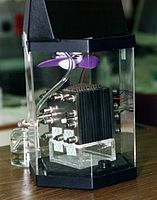
Photo from wikipedia
Abstract This paper presents an optimisation model to assess the techno-economic feasibility of a hydrogen refuelling station, which purchases power from the electricity market, supplies the mobility sector with hydrogen,… Click to show full abstract
Abstract This paper presents an optimisation model to assess the techno-economic feasibility of a hydrogen refuelling station, which purchases power from the electricity market, supplies the mobility sector with hydrogen, and participates in the ancillary service market. The problem is formed as a mixed-integer nonlinear programming model to investigate the optimal operational plans considering the nonlinear behaviour of an electrolyser and grid costs calculation model. Obtained results from various scenarios in 2020 and 2030 show that participation in the reserve market considering optimal sizing and dispatch of components increase revenues up to 16%, and as a result, decrease the hydrogen break-even price by up to 4.7% and 6.4% in 2020 and 2030, respectively. Exemption from tax and levies for connection to the grid reduces the hydrogen break-even price by up to 13%. Plant operators could benefit from the proposed approach to schedule components reliably while meeting the hydrogen demand and maximising the annual profits.
Journal Title: International Journal of Hydrogen Energy
Year Published: 2020
Link to full text (if available)
Share on Social Media: Sign Up to like & get
recommendations!